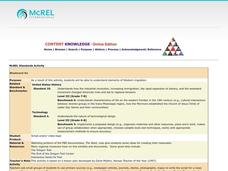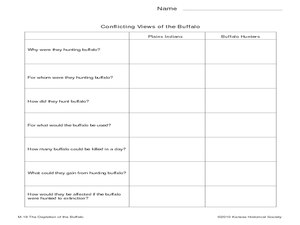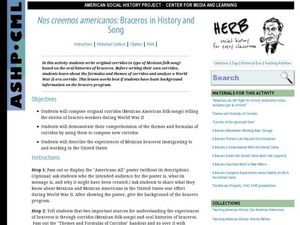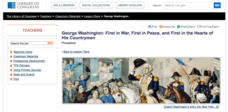Curated OER
What We Leave Behind
Students analyze primary source documents from the 1830's. They examine how records, memoirs and artifacts preserve history and discuss what should be placed in a time capsule for future generations.
Curated OER
Development of Labor Unions
Students examine the conditions that led to organized labor unions. For this 20th century America lesson, students compare and contrast the Knights of Labor Constitution, the American Federation of Labor Constitution, and the Industrial...
Curated OER
Freedom, Rights, and Responsibilities
Learners look at the primary sources that emerged from the Exodus (the Ten Commandments) and the War of Independence (the Declaration of Independence) and examine how each attempts to construct a free society and a definition of freedom....
Curated OER
Primary Source Adventures: Runaway Slaves Lesson Plan
Fourth graders examine social changes in Texas during last half of ninteenth century relating to the institution of slavery. They brainstorm methods that unhappy slaves may have used to avoid obeying their masters, and read and discuss...
Curated OER
The Great Depression
Students are be able to analyze primary sources (photographs and letters) for evidence of difficulties children faced during the Great Depression. They are asked how the government tries to help people with problems that people face to...
Curated OER
Drake’s West Indian Voyage 1588-1589
Learners examine the exploration routes of Sir Francis Drake. In this American exploration lesson, students investigate primary sources to trace the routes and contact with the natives that Sir Francis Drake experienced on his voyages in...
Curated OER
Images of the American Revolution
Students analyze several documents as they research the Revolutionary War. They evaluate documents and examine them for bias and perspective. They use their research to write monologues from the point of view of a famous Revolutionary...
Curated OER
Nomadic and Sedentary Tribes in Kansas
Seventh graders compare and contrast sedentary and nomadic tribe life. In this Native American culture lesson, 7th graders research primary documents about the Osage and Kiowa tribes. Students create a series of illustrations to be...
Curated OER
Slavery in Virginia
Fourth graders assess primary sources to analyze the effects plantation life and slavery had on Colonial Virginia. They study the issues of slavery, rural life, movements, colonization and revolution. Each student makes predictions,...
Curated OER
Segregation: From Jim Crow to Linda Brown
Students examine the African American social, economic, and political conditions between 1896 and 1953. In this segregation lesson plan, students analyze primary sources to develop an understanding of the plight of African Americans'...
Curated OER
Westward Ho
Middle schoolers examine primary sources regarding Western migration. In this Manifest Destiny lesson, students determine why the pioneers moved west and what the trip was like as they examine sources and write journals based on their...
Curated OER
The Depletion of the Buffalo
Seventh graders consider different cultural viewpoints. In this Kansas history lesson, 7th graders examine the depletion of buffalo as a contention point between Native American and European settlers. Students read diary entries to gain...
Curated OER
Who Owns The Past?
Pupils research the validity and legality of ownership. Through the use of primary sources, web based and print media research, students become familiar with and evaluate the varying viewpoints regarding the...
Curated OER
WHAT DID COLOMBUS SAY?
Students read and analyze two primary source documents written by Christopher Columbus.
Curated OER
Found Poetry with Primary Sources: The Great Depression
Students read a sample found poem and create one together as a class. In this Great Depression lesson, students select a topic, such as miners, and read primary source documents related to the topic. Students select one narrative as the...
Curated OER
New Perspectives On Teaching Afro-American History
Students examine the Great Migration of African Americans to the North from the South. After reading a primary source document, they respond to the letter given a set of questions. In groups, they research the funding for white and...
Curated OER
Nos Creemos Americanos: Braceros in History and Song
Mexican folk songs offer an authentic look at WWII immigrant workers. This study of the U.S. Bracero Program sets historians up with context information so they can write their own corrido. The class reviews themes and formulas of...
Library of Virginia
Life as a Liberated People
Imagine having no control over your life and then suddenly having to provide for yourself. Such was the challenge faced by many American slaves after emancipation. Class members are asked to consider these challenges are they examine...
Roy Rosenzweig Center for History and New Media
Slaves and Indentured Servants
In theory, at least, indentured servitude and slavery were two different practices in the American colonies. Class groups conduct a close reading of two primary source documents, one written by a slave and one by an indentured servant,...
Library of Congress
George Washington: First in War, First in Peace, and First in the Hearts of His Countrymen
Does the lens of history portray George Washington as a good leader? A three-lesson unit looks at Washington's early military career as the commander of the Virginia Regiment, his role in the fight for independence from England, and his...
Curated OER
Not Getting the News about the Stamp Act
How did American colonists react to the Stamp Act of 1765? Your young historians will examine primary source material by reading excerpts from a transcription of the Pennsylvania Gazette and then identifying the sentiments expressed by...
West Virginia Department of Education
History Scene Investigators - John Brown's Raid
An informative resource covers the event of John Brown's Raid, an event that became an important part of West Virginia history. It serves as a standalone and covers the event and John Brown's life in depth using group work, online...
Curated OER
What This Cruel War Was Over: Slavery and the Civil War
Can't travel to Richmond for your Civil War unit? This plan creates an authentic experience, using primary sources and the essential question: Over What Was the Civil War Fought? Historians examine the Appomattox Marker, the site of Gen....
Huntington Library
Further Exploration - Exploring the California Missions
How did Native Californians and Franciscans influence one another in early California? Learners analyze a few cultural pieces to examine the impact that integration had on Franciscan and Native Californian culture.

























